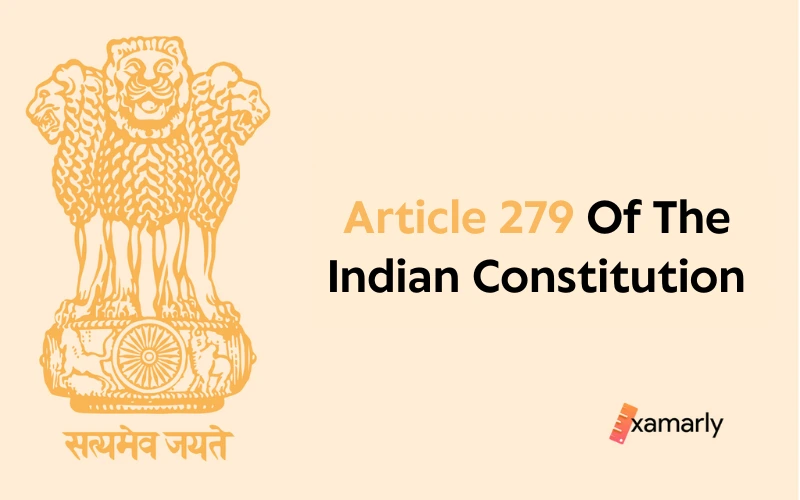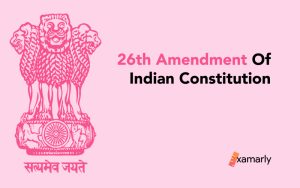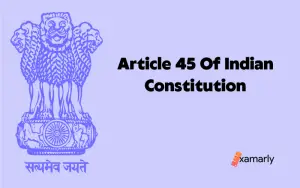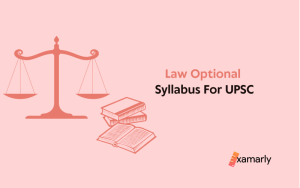An Overview
Held in Chapter I of Part XII in the Constitution of India, Article 279 of the Indian Constitution as well as Article 279A of the Indian Constitution deal with the financial provisions of the country. These are specifically related to the calculation of “net proceeds” from Union duties and taxes on goods and the formation of the Goods and Services Tax Council, respectively.
The former lays out provisions for the calculation of net proceeds by deducting the cost of collection and administrative expenses. At the same time, the latter establishes the GST Council as a constitutional body to make recommendations on taxes and other matters related to the goods and services tax.
In this blog, we will delve into the details of these articles and understand their significance in the financial administration of the country. We will also explore the role and functions of the GST Council and how it impacts the tax system in India.
- An Overview
- Article 279 Of The Indian Constitution: Provisions Related To The Calculation Of Net Proceeds
- Clause (1) Of Article 279 Of The Indian Constitution: Explained
- Clause (2) Of Article 279 Of The Indian Constitution: Explained
- Article 279A Of The Indian Constitution: Provisions For The Goods And Services Tax Council
- What Is The GST Council?
- Clause (1) Of Article 279A Of The Indian Constitution: Explained
- Clause (2) Of Article 279A Of The Indian Constitution: Explained
- Clause (3) Of Article 279A Of The Indian Constitution: Explained
- Clause (4) Of Article 279A Of The Indian Constitution: Explained
- Clause (5) Of Article 279A Of The Indian Constitution: Explained
- Clause (6) Of Article 279A Of The Indian Constitution: Explained
- Clause (7) Of Article 279A Of The Indian Constitution: Explained
- Clause (8) Of Article 279A Of The Indian Constitution: Explained
- Clause (9) Of Article 279A Of The Indian Constitution: Explained
- Clause (10) Of Article 279A Of The Indian Constitution: Explained
- Clause (11) Of Article 279A Of The Indian Constitution: Explained
- Summing Up
- FAQs Related To Article 279 Of The Indian Constitution
- Which State Does Not Fall Under Article 279A Of The Indian Constitution?
- Which Article Of The Indian Constitution Deals With GST Council?
- Which Was The First State In India To Pass The GST Bill?
- What Is The Purpose Of Article 279 Of The Indian Constitution?
- What Is The Role Of The Finance Commission According To Article 279A Of The Indian Constitution?
- How Often Is The Finance Commission Established According To The Indian Constitution?
- What Is The Significance Of The Finance Commission Of India?
Article 279 Of The Indian Constitution: Provisions Related To The Calculation Of Net Proceeds
Article 279 of the Indian Constitution lays out provisions for the calculation of “net proceeds” from Union duties and taxes on goods. This article is a part of the financial provisions of the Indian Constitution held in Part XII of Chapter I in the Constitution of India.
Clause (1) Of Article 279 Of The Indian Constitution: Explained
279. Calculation of “net proceeds”, etc.
(1) In the foregoing provisions of this Chapter, “net proceeds” means in relation to any tax or duty the proceeds thereof reduced by the cost of collection, and for the purposes of those provisions the net proceeds of any tax or duty, or of any part of any tax or duty, in or attributable to any area shall be ascertained and certified by the Comptroller and Auditor-General of India, whose certificate shall be final.
Clause (1) of Article 279 defines the term “net proceeds” and outlines the process for determining the net proceeds of any tax or duty. “Net proceeds” is defined as the proceeds of any tax or duty, reduced by the cost of collection.
It also states that the net proceeds of any tax or duty, or of any part of any tax or duty, in or attributable to any area shall be ascertained and certified by the Comptroller and Auditor-General of India.
This means that it will be the responsibility of the Comptroller and Auditor-General of India to determine the net proceeds of any tax or duty by subtracting the cost of collection from the total proceeds.
The certification of the Comptroller and Auditor-General of India shall be final and binding. Any disputes related to net proceeds shall be resolved based on the certification made by the Comptroller and Auditor-General of India.
This is an important provision because it ensures that the net proceeds of any tax or duty are calculated accurately and fairly and that the net proceeds are not inflated by the cost of collection. It also ensures that there is an impartial third party responsible for determining the net proceeds, which ensures that the process is transparent and fair.
Clause (2) Of Article 279 Of The Indian Constitution: Explained
(2) Subject as aforesaid, and to any other express provision of this Chapter, a law made by Parliament or an order of the President may, in any case where under this Part the proceeds of any duty or tax are, or may be, assigned to any State, provide for the manner in which the proceeds are to be calculated, for the time from or at which and the manner in which any payments are to be made, for the making of adjustments between one financial year and another, and for any other incidental or ancillary matters.
Clause (2) of Article 279 of the Indian Constitution describes the authority of the Parliament and the President to make laws and orders regarding the distribution of proceeds from taxes and duties that are assigned to individual States.
It states that subject to any other specific provisions in this Chapter and other laws, a law made by the Parliament or an order of the President may provide for matters the manner in which the proceeds are to be calculated, the time from or at which and the manner in which any payments are to be made, the making of adjustments between one financial year and another and any other incidental or ancillary matters.
This means that the Parliament and the President have the authority to make laws and orders that outline how the proceeds from taxes and duties should be calculated, distributed, and paid to the States. This includes specifying the time frame and payment methods, making adjustments between financial years, and other related matters.
This provision ensures that the government has the flexibility to adjust the GST system to changing circumstances and ensure that the GST system works efficiently. It also allows for adjustments to be made to the GST system as per the changing needs of the economy.
Article 279A Of The Indian Constitution: Provisions For The Goods And Services Tax Council
Article 279A of the Indian Constitution is related to the creation of the Goods and Services Tax (GST) Council. This article was inserted into the Constitution by the Constitution (One Hundred and First Amendment) Act, 2016, which established the GST Council as a constitutional body.
Overall, Article 279A is an important provision that establishes the GST Council as a constitutional body, which plays a crucial role in the implementation and administration of the Goods and Services Tax across India and helps in ensuring that the GST is implemented smoothly and efficiently.
What Is The GST Council?
The GST Council is responsible for making recommendations on the tax rate, taxes and cesses to be subsumed under the GST, exemptions and threshold limits, and other related matters. The GST Council is composed of the following members. They are the Union Finance Minister who serves as the Chairman, the Union Minister of State in charge of Revenue or Finance, and the Minister in charge of Finance or Taxation or any other Minister nominated by each State Government.
The GST Council makes recommendations based on the majority vote of the members present and voting and its decisions are binding on the Union and State governments.
Also, the GST Council is responsible for ensuring that the GST is implemented smoothly across the country and also for ensuring that the GST does not burden the poor, that it is revenue neutral for the Centre as well as the States and also for ensuring that the GST does not lead to any inflation.
Clause (1) Of Article 279A Of The Indian Constitution: Explained
[279A. Goods and Services Tax Council.
(1) The President shall, within sixty days from the date of commencement of the Constitution (One Hundred and First Amendment) Act, 2016, by order, constitute a Council to be called the Goods and Services Tax Council.
Clause (1) of Article 279A of the Indian Constitution states that the President of India is responsible for constituting the GST Council within sixty days from the date of the commencement of the Constitution (One Hundred and First Amendment) Act, 2016. The GST Council is a body that will be responsible for making recommendations on the tax rate, taxes and cesses to be subsumed under the GST, exemptions and threshold limits, and other related matters.
In simple terms, this clause says that the President of India has to create a council called the GST Council within 60 days of a specific amendment to the Indian Constitution coming into effect, and this council will be responsible for making decisions related to the implementation of GST.
Clause (2) Of Article 279A Of The Indian Constitution: Explained
(2) The Goods and Services Tax Council shall consist of the following members, namely:—
(a) the Union Finance Minister — Chairperson;
(b) the Union Minister of State in charge of Revenue or Finance — Member;
(c) the Minister in charge of Finance or Taxation or any other Minister nominated by each State Government — Members.
Clause (2) of this article describes the composition of the Goods and Services Tax (GST) Council. According to this clause, the GST Council shall consist of three types of members. Firstly, the Union Finance Minister, who will serve as the Chairperson of the Council. Secondly, the Union Minister of State in charge of Revenue or Finance will be a member of the Council. Lastly, the Minister in charge of Finance or Taxation. It could even be any other Minister nominated by each State Government. These two will also be members of the Council.
In simple terms, this clause says that the GST Council will have three types of members, the Union Finance Minister who will be the Chairperson, the Union Minister of State in charge of Revenue or Finance who will be a member and the Minister in charge of Finance or Taxation nominated by each State government who will also be members of the Council.
Clause (3) Of Article 279A Of The Indian Constitution: Explained
(3) The Members of the Goods and Services Tax Council referred to in sub-clause (c) of clause (2) shall, as soon as may be, choose one amongst themselves to be the Vice-Chairperson of the Council for such period as they may decide.
Clause (3) talks about the Vice-Chairperson of the Goods and Services Tax (GST) Council. It states that the members of the GST Council referred to in sub-clause (c) of clause (2), which is the Minister in charge of Finance or Taxation or any other Minister nominated by each State Government, shall choose one among themselves to be the Vice-Chairperson of the Council for such a period as they may decide.
In simple terms, this clause of Article 279 says that the members of the GST Council, who are nominated by each State government, will choose one of themselves as the Vice-Chairperson of the Council and they will decide how long this person will hold this position.
Clause (4) Of Article 279A Of The Indian Constitution: Explained
(4) The Goods and Services Tax Council shall make recommendations to the Union and the States on—
(a) the taxes, cesses and surcharges levied by the Union, the States and the local bodies which may be subsumed in the goods and services tax;
(b) the goods and services that may be subjected to, or exempted from, the goods and services tax;
(c) model Goods and Services Tax Laws, principles of levy, apportionment of Goods and Services Tax levied on supplies in the course of inter-State trade or commerce under article 269A and the principles that govern the place of supply;
(d) the threshold limit of turnover below which goods and services may be exempted from goods and services tax;
(e) the rates including floor rates with bands of goods and services tax ;
(f) any special rate or rates for a specified period, to raise additional resources during any natural calamity or disaster;
(g) special provision with respect to the States of Arunachal Pradesh, Assam, Jammu and Kashmir, Manipur, Meghalaya, Mizoram, Nagaland, Sikkim, Tripura, Himachal Pradesh and Uttarakhand; and
(h) any other matter relating to the goods and services tax, as the Council may decide.
The sub-clauses of clause (4) explain the responsibilities of the Goods and Services Tax Council. The Council is tasked with making recommendations to the Union government and the States (individual State governments) regarding the goods and services tax (GST) system.
Specifically, the Council is responsible for making recommendations on which taxes, cesses and surcharges currently levied by the Union, States, and local bodies should be included within the GST system, which goods and services should be subject to GST, and which should be exempt from it, the laws, principles, and regulations that govern the levy and apportionment of GST on inter-state trade or commerce, as well as the principles that determine the place of supply, and the threshold turnover limit below which certain goods and services should be exempt from GST.
Further, the Council also makes recommendations on the GST rates, including floor rates and bands for different goods and services, any special rates or temporary measures that may be implemented in the event of a natural calamity or disaster to raise additional resources. The GST Council suggests the Union government as well as the concerned State government related to any special provisions that may apply to certain states such as Arunachal Pradesh, Assam, Jammu and Kashmir, Manipur, Meghalaya, Mizoram, Nagaland, Sikkim, Tripura, Himachal Pradesh, and Uttarakhand, and also on any other matters related to GST that the Council may decide to address.
Clause (5) Of Article 279A Of The Indian Constitution: Explained
(5) The Goods and Services Tax Council shall recommend the date on which the goods and services tax be levied on petroleum crude, high speed diesel, motor spirit (commonly known as petrol), natural gas and aviation turbine fuel.
This clause of Article 279A of the Indian Constitution takes into regard the responsibility of the Goods and Services Tax Council regarding the timing of when the goods and services tax (GST) should be applied to certain types of fuel.
Specifically, the Council is responsible for recommending the date on which GST should be levied. It is charged on five specific types of fuel. These are petroleum crude, high-speed diesel, motor spirit, commonly known as petrol, natural gas, and aviation turbine fuel.
This means that the Council is responsible for determining the timing of when GST will be applied to these products and will be responsible for making that recommendation to the Union and the States.
Clause (6) Of Article 279A Of The Indian Constitution: Explained
(6) While discharging the functions conferred by this article, the Goods and Services Tax Council shall be guided by the need for a harmonised structure of goods and services tax and for the development of a harmonised national market for goods and services.
Clause (6) is about the guiding principle that the Goods and Services Tax Council should follow when performing its duties. The clause states that when the Council is carrying out the responsibilities given to it under the article, it should be guided by two main goals.
Firstly, the need for a harmonized structure of goods and services tax. This means that the Council should strive to ensure that the GST system is structured in a consistent and uniform way across the country so that it is easy to understand and administer.
Secondly, the need for the development of a harmonized national market for goods and services. This means that the Council should aim to create a national market for goods and services that are integrated and consistent across the country so that businesses can operate seamlessly and consumers have access to a wide range of goods and services.
Both of these goals are important for the Council to consider when making recommendations to the Union and the States on GST. The Council must strive to create a GST system that is both fair and easy to understand for all stakeholders, and that encourages the growth of a harmonized national market for goods and services.
Clause (7) Of Article 279A Of The Indian Constitution: Explained
(7) One-half of the total number of Members of the Goods and Services Tax Council shall constitute the quorum at its meetings.
The above-mentioned clause informs us about the minimum number of members that must be present at a meeting of the Goods and Services Tax Council in order for the meeting to be considered official and for any decisions to be made.
“One-half” means that half or 50% of the total number of members of the Council must be present. If there are not enough members present to meet the quorum, the meeting cannot be held, and any decisions made would not be considered valid.
Clause (8) Of Article 279A Of The Indian Constitution: Explained
(8) The Goods and Services Tax Council shall determine the procedure in the performance of its functions.
Clause (8) states that the Goods and Services Tax Council is responsible for establishing the rules and procedures for how it will carry out its responsibilities and functions.
This means that the Council will have the authority to establish the methods, processes, and protocols that will be used to make decisions, conduct meetings, and perform other tasks that fall within its mandate. This includes deciding on the frequency of meetings, the format and length of meetings, and the methods for voting and decision-making.
This helps to ensure that the decision-making process is efficient, transparent, and accountable. Establishing procedures also allows the Council to have control over its operations, by outlining the steps to be taken in order to achieve its goals and objectives.
Clause (9) Of Article 279A Of The Indian Constitution: Explained
(9) Every decision of the Goods and Services Tax Council shall be taken at a meeting, by a majority of not less than three-fourths of the weighted votes of the members present and voting, in accordance with the following principles, namely:—
(a) the vote of the Central Government shall have a weightage of one-third of the total votes cast, and
(b) the votes of all the State Governments taken together shall have a weightage of two-thirds of the total votes cast, in that meeting.
Clause (10) of Article 279A sheds light on the process for how decisions are made by the Goods and Services Tax Council. It states that every decision of the Council must be taken at a meeting and that the decision must be made by a majority of at least three-fourths of the weighted votes of the members present and voting. This means that in order to make a decision, a large majority, that is, 75% of the members present at the meeting must vote in favour of the decision.
It also mentions two different types of members, the Central Government and the State Governments. The sub-clauses of clause (9) of Article 279A specify that the vote of the Central Government shall have a weightage of one-third of the total votes cast. On the other hand, the votes of all the State Governments taken together shall have a weightage of two-thirds of the total votes cast.
This means that the Central Government’s vote carries less weight than the combined votes of all the State Governments. This weightage system is used to ensure that decisions made by the Council take into account the perspectives of both the Central government and the State governments.
This weightage system is used to ensure that decisions made by the Council take into account the perspectives of both the Central government and the State governments. The weightage system ensures that the decisions taken by the Council are not swayed by any particular group or individual.
Clause (10) Of Article 279A Of The Indian Constitution: Explained
(10) No act or proceedings of the Goods and Services Tax Council shall be invalid merely by reason of—
(a) any vacancy in, or any defect in, the constitution of the Council; or
(b) any defect in the appointment of a person as a Member of the Council; or
(c) any procedural irregularity of the Council not affecting the merits of the case.
Clause (10) revolves around the provisions that protect the validity of the acts and proceedings of the Goods and Services Tax Council. It states that no act or proceedings of the Council shall be considered invalid due to any vacancy in the Council or any defect in its constitution. The Council shall not be considered invalid in case of any defect in the appointment of a member of the Council, or any procedural irregularity of the Council that does not affect the merits of the case.
This means that even if there are any issues with the composition of the Council, the appointment of its members, or the way in which the Council conducts its business, the actions and decisions of the Council will still be considered valid and binding. This provision is in place to ensure that the Council can continue to function effectively despite any administrative or procedural issues that may arise.
This provision also means that even if there are any procedural or administrative errors, the decisions of the Council will still be considered valid as long as they do not affect the outcome of the case. This is to ensure that the decision of the Council is based on the merits of the case and that it is not invalidated due to any procedural errors.
Clause (11) Of Article 279A Of The Indian Constitution: Explained
(11) The Goods and Services Tax Council shall establish a mechanism to adjudicate any dispute—
(a) between the Government of India and one or more States; or
(b) between the Government of India and any State or States on one side and one or more other States on the other side; or
(c) between two or more States,
arising out of the recommendations of the Council or implementation thereof.]
The final clause of Article 279A of the Indian Constitution describes the role of the Goods and Services Tax Council in resolving disputes that may arise in relation to the recommendations of the Council or their implementation. The Council is tasked with establishing a mechanism to resolve any disputes that may arise between the Government of India and one or more States or the Government of India and any State. The Council also exercises its authority in cases of dispute between the States on one side and one or more other States on the other side, or between two or more States.
This means that the Council is responsible for creating a system for resolving disputes that may arise in relation to its recommendations for GST or the implementation of those recommendations. This is important to ensure that any disputes that may arise are resolved in a fair and efficient manner and to ensure that the GST system operates smoothly.
The disputes can be related to the interpretation of the GST laws, the implementation of the GST laws and the recommendations of the GST Council. The establishment of a mechanism to resolve disputes is important to ensure that any conflicts can be resolved in a timely and efficient manner, without disrupting the GST system.
You Might Also Like:
| Article 275 Of The Indian Constitution | Article 276 Of The Indian Constitution |
| Article 277 Of The Indian Constitution | Article 278 Of The Indian Constitution |
Summing Up
After gaining a deep understanding of Articles 279 and 279A of the Indian Constitution, we can conclude the following from the clauses present in them.
- Article 279 of the Indian Constitution that it defines the term “net proceeds” and outlines the process for determining the net proceeds of any tax or duty.
- Net proceeds are the proceeds reduced by the cost of collection, determined by the Comptroller and Auditor-General of India. This includes specifying the time frame and payment methods, making adjustments between financial years, and other related matters.
- Furthermore, concluding Article 279A of the Indian Constitution, we can say that it is related to the creation of the Goods and Services Tax (GST) Council.
- The GST Council is responsible for making recommendations on the tax rates, taxes and cesses to be subsumed under the GST.
FAQs Related To Article 279 Of The Indian Constitution
Which State Does Not Fall Under Article 279A Of The Indian Constitution?
Jammu and Kashmir is the only State in India that does not fall under Article 279A of the Indian Constitution. This is because Jammu and Kashmir has a separate Constitution and laws that govern its financial management.
Which Article Of The Indian Constitution Deals With GST Council?
Article 279A of the Indian Constitution deals with the GST Council. It provides for the creation of a Goods and Services Tax Council, which shall consist of the Union Finance Minister as its Chairperson, the Minister of State in charge of Revenue or Finance of each State and two other nominated members.
This Council is responsible for making recommendations to the Union government and the State government on issues related to GST, including the rates of tax and the goods and services that may be subject to GST.
Which Was The First State In India To Pass The GST Bill?
Assam was the first State in India to pass the GST Bill, on August 12, 2016. The Bill was passed by the State Assembly and was subsequently ratified by the President of India. This move was seen as a significant step towards the implementation of the Goods and Services Tax (GST) in India.
What Is The Purpose Of Article 279 Of The Indian Constitution?
Article 279 of the Indian Constitution establishes the Finance Commission as a constitutional body to recommend the distribution of tax revenues between the Central government and the State government and among the States themselves.
What Is The Role Of The Finance Commission According To Article 279A Of The Indian Constitution?
Article 279A of the Indian Constitution expands the duties of the Finance Commission to include making recommendations to the President of India on increasing funds in the Consolidated Fund of a State. This is with the aim to supplement the resources of the Panchayats and Municipalities in the State on the basis of the recommendations made by the Finance Commission of the State.
How Often Is The Finance Commission Established According To The Indian Constitution?
The President is empowered to constitute a Finance Commission every five years.
What Is The Significance Of The Finance Commission Of India?
The Finance Commission of India plays a crucial role in determining the financial relationship between the Central government and the State governments. It also ensures fiscal federalism in the country. Its recommendations are considered important for the financial stability of the country.






